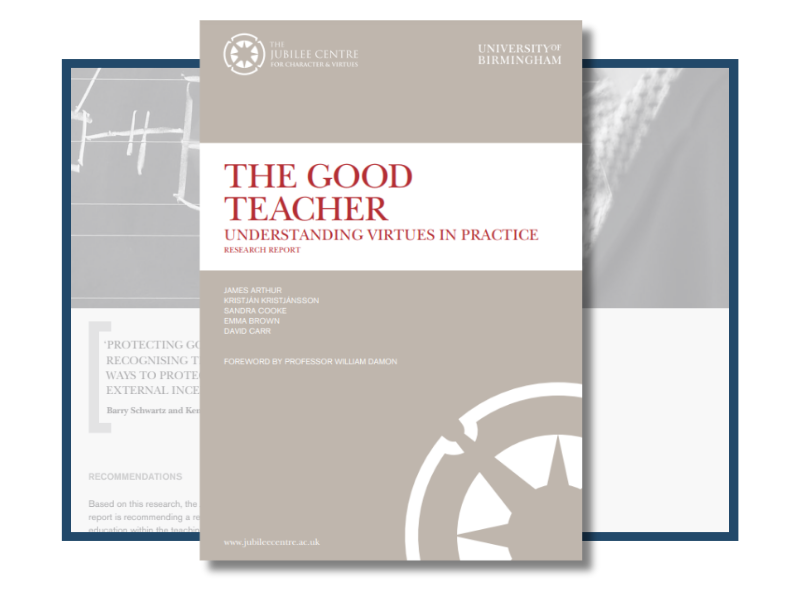Project Overview
The Good Teacher report was launched by The Right Honourable The Baroness Morris of Yardley on Friday 27th February 2015 at the City of Birmingham Council House. This report describes research that focused on virtues and character in teaching. The research explored the virtues that the good teacher might need and the role those virtues play in teaching. The research drew on empirical data from an interview and questionnaire based study of 546 novice and experienced teachers and their educators.

Summary of Key Findings
The Jubilee Centre’s research found that moral ethics have always played a central role
in good education and practice:
- In interview scenarios, a large number of teachers agreed that developing character can have a positive impact on learning. They saw character education as integral to their teaching.
- Teachers confirmed that they frequently draw upon virtue-based reasoning in the classroom, especially in areas of moral or practical significance.
- A large number of teachers also had high expectations of the difference they can make with the children they teach.
- There is also widespread agreement on the personal qualities that are needed to be a good teacher. The majority of teachers surveyed saw fairness (78%), creativity (68%), a love of learning (61%), humour (53%), perseverance (45%) and leadership (40%) as the six most important character strengths for good teachers. However,
- In describing their own character strengths, they reported kindness (49%) and honesty (50%) in place of leadership and perseverance in those top six.
Key Recommendations
The report recommends a review of ethics education within the teaching profession and calls for more time to be given to the teaching of moral virtues within teacher education courses and the teaching workplace. It specifically recommends that:
- Initial teacher education includes some focus on the development of the moral agency of teachers.
- Training for teachers should include academic input concerning the integral role of moral virtues in teaching.
- Greater recognition of the moral importance of mentoring in teaching is needed.
- An emphasis on moral character is needed throughout a teacher’s career, and needs to be reflected in CPD programmes, to ensure that the early enthusiasm of teachers wanting to make a difference is sustained.
- Policy makers, school management and governors need to pay proper attention to issues of character in their practice, and ensure that priority is given to this in future planning.
Project Summary
There is a growing consensus in Britain that virtues such as honesty, self-control, fairness, gratitude and respect, which contribute to good moral character, are part of the solution to many of the challenges facing society today.
Schools and businesses increasingly understand the need for their organisations, pupils and employees to follow moral principles based on such virtues. Research suggests that children live and learn better when they are able to apply moral virtues, such as honesty, kindness and gratitude, and businesses operate better when demonstrating moral integrity. However, until recently, the materials required to deliver this ambition have been missing in Britain.
School teachers play a critical role in the formation of young people, shaping the moral character of their students. The best teachers exemplify a set of virtues which they demonstrate through personal example. Yet, in Great Britain, little attention has been paid to character in teaching, and specifically, to the moral virtues that teachers are required to adopt and introduce into the classroom.
This report sets out Jubilee Centre research, focusing on the virtues that the good teacher might need and the role those virtues play in teaching.
Drawing upon empirical data from an interview and questionnaire-based study of 546 novice and experienced teachers and their educators, the research explores:
- The most important character strengths, or virtues, needed for good teaching.
- The reported character strengths, or virtues, held by today’s teachers.
- The ways in which character strengths, or virtues, influence teaching in practice.
- The ways in which regulatory and organisational structures facilitate good teaching.
- The ways in which initial and continued professional education contribute to the further development of good teaching.
Appendices
Download the online appendices below:
